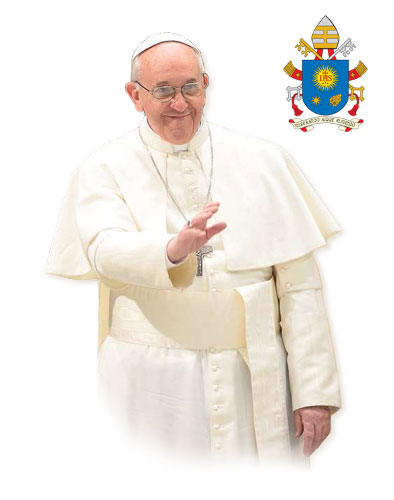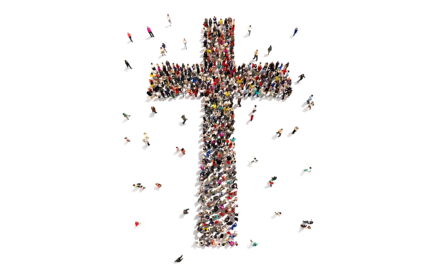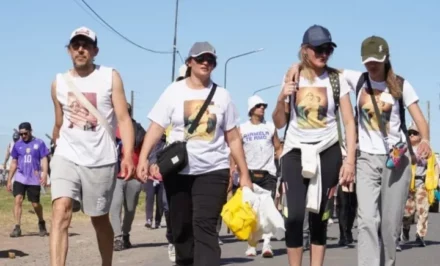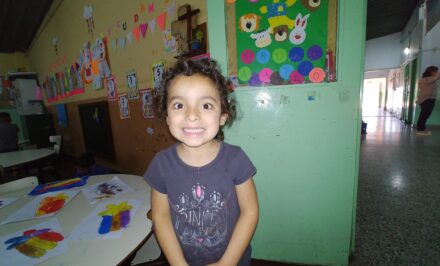 org. Every part of the Church, and many others outside of her – believers or non-believers – have received Pope Francis` clear and hope-filled words. They are also words that motivate us to assume the responsibility we all have to build a world in accordance to the Will of God, in the strength of the Spirit and through the way of Christ. Cardinals and bishops, priests, men and women religious, novices and seminarians, families, the youth and elderly, communities and institutes have received this challenge to go out “onto the street” to take – not a utopian hope – but concrete deeds in living evangelization projects to all men and women wherever they may be. And if they are on the “outskirts” then we have to go there, with all the risks and dangers it may include. He repeats to us constantly: I prefer an injured church, because she goes out to serve, to a Church that is sick because of her self-absorption. Testimony to this can be found in the section of Schoenstatt.org where on a weekly basis texts are selected which motivate us on our own pilgrimage toward the 2014 Jubilee. Undoubtedly, because we are the Church, these words are also directed to us. How happy must our Father not be with this missionary impetus which is given to us from the very heart of the Church! (Fr. José María García)
org. Every part of the Church, and many others outside of her – believers or non-believers – have received Pope Francis` clear and hope-filled words. They are also words that motivate us to assume the responsibility we all have to build a world in accordance to the Will of God, in the strength of the Spirit and through the way of Christ. Cardinals and bishops, priests, men and women religious, novices and seminarians, families, the youth and elderly, communities and institutes have received this challenge to go out “onto the street” to take – not a utopian hope – but concrete deeds in living evangelization projects to all men and women wherever they may be. And if they are on the “outskirts” then we have to go there, with all the risks and dangers it may include. He repeats to us constantly: I prefer an injured church, because she goes out to serve, to a Church that is sick because of her self-absorption. Testimony to this can be found in the section of Schoenstatt.org where on a weekly basis texts are selected which motivate us on our own pilgrimage toward the 2014 Jubilee. Undoubtedly, because we are the Church, these words are also directed to us. How happy must our Father not be with this missionary impetus which is given to us from the very heart of the Church! (Fr. José María García)
![]()
WEEK 19/2014
What does “evangelise” mean? To give witness with joy and simplicity to what we are and what we believe in.
Tweet from 05.05.2014

The Gospel for this Sunday, which is the Third Sunday of Easter, is the disciples on the road to Emmaus (Lk, 13-35). These were two of Jesus’ disciples who, after his death and the Sabbath, leave Jerusalem and return, saddened and downcast, to their village, Emmaus. Along the way, the resurrected Jesus approaches them but they do not recognise him. Seeing their sadness, He first helped them to understand that the passion and death of the Messiah was part of God’s plan and had been prophesied in the sacred scriptures, and so he rekindled the fire of hope in their hearts. At this point, the two disciples felt an extraordinary attraction to this mysterious man and invited him to stay with them for the night. Jesus accepted and entered their home. And when he was at table, he blessed the bread and broke it, this is when they recognised him, but He disappeared from their sight, leaving them amazed. After they had been illumined by the Word, they recognised the resurrected Jesus in the breaking of bread, a new sign of his presence. They immediately felt the need to return to Jerusalem to share their experience with the other disciples, that they had met the living Jesus and had recognised him in the breaking of the bread.
Angelus, 4.5.2014
The road to Emmaus, therefore, becomes a symbol of our journey of faith: The scriptures and the Eucharist are indispensable elements in our encounter with the Lord. We also arrive at Sunday Mass distracted by our worries, difficulties and disillusions. Life sometimes hurts us and we are sad as we go towards our ‘Emmaus,’ turning our backs on God’s plan. We distance ourselves from God. But the Liturgy of the Word draws us: Jesus explains the Scriptures to us and rekindles the fire of faith and hope in our hearts and gives us strength in the Eucharist. The Word of God and the Eucharist: read a part of the Gospel every day, remember this, read a part of the Gospel every day and on Sundays, go and receive Jesus in Holy Communion. This is what happened with the disciples on the road to Emmaus, who received the Word and shared in the breaking of bread, and from their sadness and defeat, they experienced joy. Always, dear brothers and sisters, the Word of God and the Eucharist fill us with joy. Remember this. When you are sad or down, read the Word of God! When you are disheartened, read the Word of God and go to Communion at Sunday Mass, to participate in the mystery of Jesus! Word of God, Eucharist: fill us with joy. Through the intercession of the Virgin Mary, we pray that all Christians, reliving the experience of the disciples on the way to Emmaus, especially in Sunday Mass, can discover the grace of the transforming encounter with the Lord, the Resurrected Lord who is always with us. There is always a Word of God that guides us in our confusion; and in our weariness and disillusion, Bread that is broken always helps us continue along the way.
Angelus, 4.5.2014
The Lord is not worried about how many followers he has, it does not occur to him, for example, to conduct a census to see if the Church is growing…no! He speaks, preaches, loves, accompanies, walks the road with the meek and humble people. And he speaks with authority, that is, with the power of love.
Santa Marta, 2.5.2014
 The religious authorities of the time could not tolerate people following Jesus! They could not tolerate it! They were jealous. This is an ugly attitude. From jealousy to envy, and we know that the father of envy is the devil. And through envy evil entered the world. These people knew well who Jesus was: they knew it! These were the same people who had paid the guards to say that the apostles had stolen Jesus’ body! They had paid to silence the truth. But people are bad, truly! Because when we pay to hide the truth, we are very bad. And because of this, the people knew who these people were. They did not follow them, they tolerated them only because they had authority: the authority over worship, the authority of the ecclesiastical discipline at the time, authority over the people…and the people went along. Jesus said of them that they tied oppressive burdens over the faithful and put them on the shoulders of the people. These people do not tolerate Jesus’ meekness, they do not tolerate the meekness of the Gospel, do not tolerate. And they pay out of envy, hate.
The religious authorities of the time could not tolerate people following Jesus! They could not tolerate it! They were jealous. This is an ugly attitude. From jealousy to envy, and we know that the father of envy is the devil. And through envy evil entered the world. These people knew well who Jesus was: they knew it! These were the same people who had paid the guards to say that the apostles had stolen Jesus’ body! They had paid to silence the truth. But people are bad, truly! Because when we pay to hide the truth, we are very bad. And because of this, the people knew who these people were. They did not follow them, they tolerated them only because they had authority: the authority over worship, the authority of the ecclesiastical discipline at the time, authority over the people…and the people went along. Jesus said of them that they tied oppressive burdens over the faithful and put them on the shoulders of the people. These people do not tolerate Jesus’ meekness, they do not tolerate the meekness of the Gospel, do not tolerate. And they pay out of envy, hate.
Santa Marta, 2.5.2014
With their political manoeuvres, with their ecclesiastical manoeuvres, they continue to dominate the people…And so, they ordered the apostles to come [to them], after what the wise man said, they called the apostles, had them flogged and ordered them not to speak the name of Jesus. And then they set them free. They had to do something: let’s give them a good hiding and then send them home! Unfair, but this is what they did. They were the masters of conscience, and they felt that they had the power to do it. Masters of conscience…also today, there many of these in the world. I cried…when I saw the news in the media about Christians crucified in a certain non-Christian country. Also today, there are people like this, who kill, persecute in the name of God. And today, we also see so many who, like the apostles, feel happy to have been deemed worthy to suffer dishonour for the name of Jesus.
Santa Marta, 2.5.2014
First icon [depicted in the Readings]: Jesus with the people, love, the way he taught us and the way we should go. Second icon: the hypocrisy of these religious leaders of the people who imprisoned the people with these commandments, with this cold, hard legality, and who also paid to hide the truth. Third icon: the joy of the Christian martyrs, the joy of so many of our brothers and sisters who throughout history have felt this joy, this gladness of having been deemed worthy to suffer dishonour for the name of Jesus. And there are so many today! Think that in some countries, you can go to prison, just for carrying the Gospel. You cannot wear a cross: they will make you pay a fine. But the heart is glad. The three icons: let us look at them today. It is part of our history of salvation.
Santa Marta, 2.5.2014
Do we serve the Lord out of love or to gain some benefit? Because we are all sinners and therefore, we always have some interest that needs to be purified in the way we follow Jesus; and we have to work interiorly to follow Him, for Him, for love. Jesus alludes to three attitudes that are not good for following Him or finding God. The first is vanity. He refers to those important people, those leaders who hand out alms or fast to be seen. These leaders want to be seen, they like this — to use the right words – they liked to show off and are really as vain as peacocks! This is how they were. And Jesus says: ‘No, no: this is not on. It is not on. Vanity is not right’ And sometimes, we do things to be seen, seeking vanity. Vanity is dangerous because it immediately makes us slide into pride, arrogance and that’s where everything ends. And I ask: How do I follow Jesus? The good things that I do, do I do them in secret or do I like to be seen? And I also think about us, pastors, because a pastor who is vain does not benefit for God’s people: he can be a priest or a bishop but he does not Jesus if he likes vanity.
Santa Marta, 5.5.2014
The other think that Jesus reproaches in his followers is power: Some follow Jesus, a bit, not completely consciously, a little unconsciously, because they seek power, not so? The clearest example is James and John, the sons of Zebedee, who asked Jesus for the grace to be prime minister and vice prime minster when God’s Kingdom comes! And there are climbers in the Church! There are many who use the Church to climb! But if you like to climb, it would be better to go up north and become mountain climbers: it’s healthier! But do not come to the Church to climb! And Jesus reproaches these climbers who seek power. The disciples only changed when the Holy Spirit came. But in our Christian lives sin remains and it would do us good to ask: How do I follow Jesus? For his sake alone, even to the Cross? Or do I seek power and use the Church, the Christian community, the parish, the diocese to have a bit of power?
Santa Marta, 5.5.2014
The third thing that distances us from the right intentions is money: those who follow Jesus for money, try to profit financially from the parish, the diocese, the Christian community, the hospital, the school…Think about the first Christian community who had the same temptation: Simon, Ananias and Sapphira…this temptation has been there since the beginning and we have known so many good Catholics, so many good Christians, friends, benefactors of the Church, including those who have received various awards…so many…and it later emerges that they were involved in shady deals: they were real profiteers and made a lot of money! They presented themselves as benefactors of the Church but they received so much money, and it was not always clean money. We ask the Lord for the grace of the Holy Spirit to follow him with the right intention: only for His sake. Without vanity, without the desire for power or the desire for money.
Santa Marta, 5.5.2014
![]()
The aim of the pilgrimage
is the renewal of the covenant of love
as a missionary and unifying creative force,
i.e. internally the renewal of the Schoenstatt Family
and externally the shaping of covenant culture.













